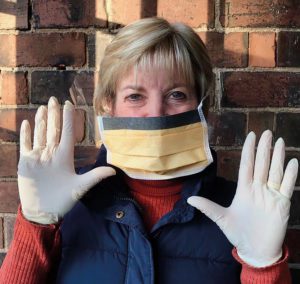Dr Maggie Paul reflects on remaining faithful in strange times
This article was published in the May to August 2020 issue of Rapport magazine.
 As I write, it was only six days ago when Boris Johnson announced the need for ‘social distancing’– and yet normal life seems a world away. At this stage we are all in state of shock as we try and adjust to new ways of working, new ways of living – and new ways of relating to each other.
As I write, it was only six days ago when Boris Johnson announced the need for ‘social distancing’– and yet normal life seems a world away. At this stage we are all in state of shock as we try and adjust to new ways of working, new ways of living – and new ways of relating to each other.
As a GP, I am very aware of the seriousness of the situation that the Covid-19 virus has created. If we took no action, then the Health Service would be overwhelmed by the number of people needing intensive medical support. One of the key aspects of my medical work is keeping in touch with patients and seeing them face-to-face. Yet now we are having to do at least 80% of consultations over the phone, either in audio or video. This can work well, since we know our patients, but it is not clear whether this will be satisfactory in the long term.
Continuing to love and care for each other
And we face similar challenges as Christians, as disciples of Jesus in fellowship with one another. How can we maintain our relationships of love, prayer and support for one another if we cannot easily meet? What does ‘church’ mean if we cannot meet week by week for the coming months? We too, will have to find new ways of learning what it means to be church together. But there are some key things we can bear in mind.
Have faith
Firstly, do not fear. When Jesus was in the boat with his disciples on the Sea of Galilee in Mark 4, there was real reason to fear – and these seasoned sailors were terrified. Many people are fearful, not just of illness, but of uncertainty, and the economic implications of the measures being taken. And yet Jesus is asleep in the boat, His head resting on a cushion. When He wakes, He does not rebuke the disciples for being fearful – but He does invite them to have faith, and He says the same to us.
Keep connected
Secondly, do not lose touch. Even if we cannot meet, we belong to one another as parts of the body of Christ. Technology has provided some amazing ways we can keep in contact, from internet video chatting to a simple phone call.
Ask for help
Thirdly, don’t hesitate to ask. Those who are vulnerable because of the virus, because of age or underlying conditions, should never worry about asking for help. It is the job of the rest of us to respond in times like these.
Continue to pray
Finally, don’t cease praying. God is not constrained by the virus, even if we are. When Daniel was in exile in Babylon, he prayed at his window at the times when the morning and evening sacrifice would have been offered in Jerusalem, a sign of His trust and hope in God. We need to continue in our own rhythms of Bible reading and prayer – and perhaps you could agree with some friends to all pray for one another at the same time each day. Even if we are at a physical distance, we can be close in time and in prayer.
When our resources are limited, we need to lean into God’s provision. As Paul reminds us:
‘And my God will meet all your needs according to the riches of his glory in Christ Jesus.’
(Philippians 4.19)
Dr Maggie Paul is a GP and member of the Lee Abbey Council
